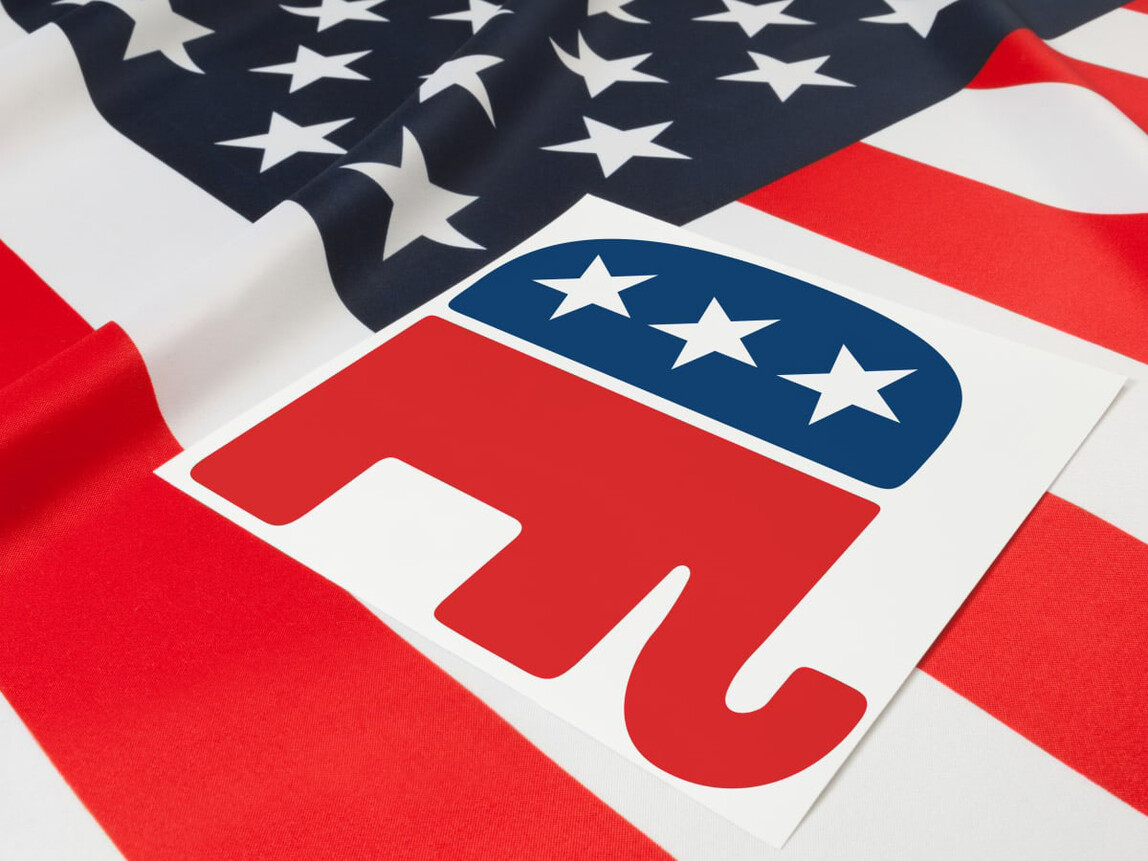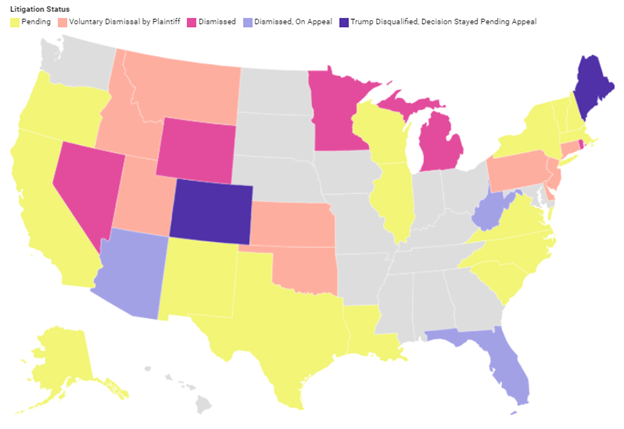Republican strategy for the 2024 presidential elections in the United States

This paper will refer to the strategy of the main contender for the Republican nomination, Donald Trump, in the context of the primaries and not the November elections[1]. This is because, unlike in 2020, when Trump occupied the White House and was unchallenged within his party, in this election cycle he must compete for the Republican nomination.
The remaining candidates[2], led by Florida Governor Ron DeSantis and former South Carolina Governor Nikki Haley, trail Trump in the polls by considerable margins. Their main chances of victory lie in winning, surprisingly, some of the initial primaries and sustaining that momentum in the following months.
In addition to his longevity, Trump faces obstacles that may prevent or hinder his nomination as his party’s candidate, which increases the degree of uncertainty associated with the upcoming elections. It is important to keep in mind that the nomination is official once it is so decided at the party’s national convention, which in the case of the Republicans will be between July 15 and 18.
Primary Process
January 15 is the starting date for the Republican primary process, with caucuses in Iowa[3]. It will not be parallel for both parties, due to the decision of the Democratic National Committee to start in South Carolina, on February 3[4]. This is due to the fact that the primary process extends until the middle of the year and is different for each party, which, together with the states, are in charge of its organization.
The Republican pre-candidates will be striving for 2,429 delegates[5], 70% of which will be up for grabs before April begins.
Since mid-2023, the Republican pre-candidates have held debates in different states across the country, where Trump qualified for, but opted to skip and schedule parallel appearances.
The legal cases against Trump
Former President Trump faces 91 criminal charges in 4 cases: 2 in state courts and 2 in federal districts. Any of these cases could lead to jail time.
Additionally he is dealing with a civil lawsuit in New York that could affect his business operations plus a defamation case.
Adding to the complexity of having a potential presidential nominee who is even suspected of the charges against him is the fact that these issues will be resolved in the middle of the election cycle. However, the U.S. Constitution does not include among the requirements to aspire to the presidency to be out of prison or to have no pending cases with the justice system[6].
Manhattan District Attorney Alvin Bragg filed 34 criminal charges against Trump in March 2023 related to falsifying business documents as part of a scheme to covertly pay women who claimed to have had sex with Trump. The trial is due to take place on March 25, 2024. Although it relates to a crime possibly committed by the former president, it is the least troublesome matter, as it does not cover the most serious allegations.
In June 2023, Justice Department-appointed special prosecutor Jack Smith filed 37 charges against Trump for removing sensitive documents from the White House at the end of his presidency. Those charges include obstruction of justice, withholding national security information and false statements. The trial was set for May 20, 2024. It should be noted that the judge appointed to the case, Aileen Cannon (born in Colombia to a Cuban mother), was appointed by Trump and her record shows that she has favored him on occasions.
Fani Willis, district attorney of Fulton County (Georgia), filed charges against 19 people-including Trump- in a scheme to reverse the results of the 2020 presidential election. It is the most sensitive indictment because it is an attempt to subvert the foundations of the political system and American «democracy», and the prosecutor has strong evidence. Some of those involved have already entered into plea agreements by the end of 2023. The rest are due to stand trial on August 5, 2024.
The aforementioned special prosecutor Jack Smith also charged Trump with four other counts of attempting to subvert the 2020 election and the trial is set for March 4, 2024. The Supreme Court refused to hold an expedited hearing to clarify whether Trump has immunity, as alleged by his lawyers, so the regulatory steps must be fulfilled for the highest judicial instance to decide whether to rule on the matter.
New York Attorney General Letitia James filed a civil lawsuit against Trump, his adult children and a former advisor for fraudulently declaring the value of properties to lower his tax bill or improve loan terms as part of a scheme to pump up his net worth. The case could end with million-dollar fines and a ban on Trump’s company from doing business in New York.
Trump is barred from speaking publicly about this New York case and Smith’s case in Washington, D.C., to prevent him from continuing to make intimidating comments against prosecutors and witnesses[7].
Furthermore, Trump is involved in a defamation case against writer E. Jean Carroll, who claimed that Trump sexually assaulted her in the 1990s. In the middle of last year, a jury concluded that the provocation took place and, as a result, Trump was required to pay $5 million.
Trump’s legal team has tried to postpone the trial dates against him, and although judges have refused, it is possible that in some cases they will be reconsidered. The key pressure on the counterparties is that, should Trump or another Republican become president, they can maneuver to stop the cases against them as of January 20, 2025[8].
The 14th Amendment
One of the constants during the Trump administration was the need to review the limits of legality, especially on issues that have been scarcely addressed. The most current case is that associated with a fragment of the 14th Amendment to the Constitution: a text added after the Civil War to prevent those who had revolted from being able to take part in the exercise of government[9]. Because of the narrow scope it covers, it had hitherto been treated as a fragment overlooked by legal experts.
However, since mid-2023 a legal strategy to prevent Trump from appearing on the ballot in several states gained momentum, after two court cases were initiated regarding the former president’s attempts to change the results of the 2020 election in his favor. As part of that effort, lawsuits based on Section 3 of the 14th Amendment were filed before different bodies in 34 states, alleging that Trump is ineligible to be president due to his attempts to reverse his defeat and for inciting the assault on Capitol Hill. The following map reflects where each of them stands[10].

The most relevant cases are Colorado and Maine, both of which decided to exclude Trump from the ballot in their states[11]. However, neither will apply until the Supreme Court rules on the matter[12], as it agreed to take Colorado’s case[13].
Trump’s campaign strategy
Trump’s campaign team is conducting its operations as if he were anacting president, thanks to the wide lead in the polls over the rest of the pre-candidates. Their goal is to get Trump the delegates he needs to win the nomination before he is convicted in any of the cases against him.
In this sense, Trump has set out to gather as many endorsements[14] as possible from numerous contacts with influential people in the Republican Party to whom he promises favors or threatens retaliation[15]. These are most evident in his defiant postings on Truth Social network.
The public support of relevant figures within the Republican machine and the constant backing of his electoral base leave little room for his opponents to maneuver in the primaries.
Trump continues to describe himself as an outsider, someone outside the Washington establishment, which reinforces his message that the cases against him are part of a political persecution. The other central theme of his statements continues to be that the 2020 election was stolen, thus maintaining his position as a victim of the political system controlled by the Biden administration and the Democratic Party. Taken together, these messages have proven effective for his electoral base and have been instrumental in his campaign fundraisers[16].
Another tactic that may prove crucial in the primary process has been to change the rules in early states such as Nevada, California and Michigan.
Nevada is a particularly important state as it is the third in delegate allocation and, within American logic, its outcome has the ability to significantly influence subsequent states. Trump has had close access to the main party authorities in the state and in a matter of months the rules governing the elections were modified. Thus, the campaign of his closest challenger, Florida Governor Ron DeSantis, was affected[17].
Added to this is the decision to maintain the traditional caucus format, in contradiction to a recent state law that established a shift to a primary format. The result is that the Republican primaries will take place on February 6, with Nikki Haley as the only current candidate on the ballot and, two days later, the party caucuses. However, only whoever wins the latter will attain the state’s delegates, in a move that is expected to benefit Trump.
Another important change in the rules in early states took place in California: the candidate who exceeds 50% of the votes in the state will receive all the delegates. Under the previous mechanism, each district awarded candidates independently, so the state’s 169 delegates could be divided among several candidates. Currently, the only candidate strong enough to garner the required support is former President Trump.
In both Nevada and California the changes have meant that the DeSantis campaign has suspended major field operations, further weakening his chances.
The gaps that Trump’s mandatory court appearances could mean for the campaign will be filled by surrogates. While it is customary to include public endorsers and friendly politicians at campaign events, strategists have said the number and nationwide recognition of Trump’s surrogates are unusual compared to his previous campaigns[18].
Conclusions
Republicans are currently grappling with the combination of a weak party and deep political polarization, manifested in the sharp divide between traditional conservatives and the party leadership on the one hand and, on the other, the party’s grassroots who largely favor Trump. The messages mobilizing the latter are increasingly reactionary and the consequences are visible in Trump’s continued popularity and the rightward trend of the party’s agenda.
El expresidente mantiene una aprobación constante entre sus bases, un fuerte camino hacia la nominación republicana y un amplio apoyo de funcionarios republicanos electos, a pesar de haber promovido una insurrección contra el gobierno, haber sido sometido a dos procesos de impeachment, haber dirigido una caótica gestión de la pandemia, ser singularizado como una de las causas principales del débil desempeño de su partido en las elecciones de medio término en 2022 y estar envuelto en varios litigios que podrían conducirlo a la cárcel o impedirle ocupar la Casa Blanca, por solo citar las mayores particularidades de su carrera política. Nunca en la historia de los Estados Unidos ha sido electo alguien que haya atentado abierta y repetidamente contra las normas éticas y políticas fundamentales.
The former president maintains consistent approval among his base, a solid path to the Republican nomination and broad support from Republican elected officials, despite having promoted an anti-government insurrection, having been subjected to two impeachment processes, having led a chaotic management of the pandemic, being singled out as one of the main causes of his party’s weak performance in the 2022 midterm elections and being involved in several lawsuits that could mean jail time or prevent him from occupying the White House, just to cite the major particularities of his political career. Never in the history of the United States has someone been elected who has openly and repeatedly violated fundamental ethical and political norms.
[1] This article is a continuation of a series of analyses prior to the 2024 elections in the United States published on the CIPI website.
[2] Thirteen candidates began running for the nomination, of whom eight have withdrawn. Only Donald Trump, Ron DeSantis, Nikki Haley, Vivek Ramaswamy and Asa Hutchinson remain. In polls conducted by 12 firms between the second half of December and so far in January, support for the Republican candidates is as follows: Trump at 60-65%, DeSantis at 11-14%, Nikki at 11-13% and Ramaswamy at 4-7%. In recent CNN and Bloomberg News/Morning Consult polls, Trump has led Biden in the key states of Georgia, Arizona, Michigan, Pennsylvania, Wisconsin and North Carolina by differences ranging from 3 to 11 points. Other polls have also given him slight leads among independents. 14% of Republicans believe Trump bears responsibility for the attacks on Capitol Hill, while among independent voters it is 56%.
[3] A form of organizing a party primary, which can have several formats and whose purpose is to achieve consensus among the participants. The best known requires voters to gather in public places and group themselves according to the candidate they support. Caucuses are organized by political parties and primary elections are organized and financed by the states.
[4] The postponement of the Democratic caucuses in Iowa has not generated major contradictions, unlike the case of the primaries in New Hampshire. The constitution of that state legislates that it must be the first to hold primaries in the country. The state decided to hold its primary on January 23, contrary to the calendar approved by the Democratic National Committee, so it will be without the presence of Biden on the ballot. This may lead to the incumbent not winning the state’s delegates, unless an initiative to have voters write his name on the ballot is successful.
[5] Of these, 2 365 delegates and 104 super delegates. The former are pledged to reflect in their National Convention vote the outcome of the state, at least on the first ballot, while the latter are under no obligation to respect this correspondence. The nomination is awarded to the pre-candidate who achieves the majority, or 1,235.
[6] The requirements are: to be a U.S. citizen by birth, to be at least 35 years old and to have lived in the U.S. for at least 14 years.
[7] Judge reinstates gag order on Trump in federal election subversion case, https://edition.cnn.com/2023/10/29/politics/trump-gag-order-reinstated/index.html
[8] The Atlantic’s tally of cases against Trump, which can be accessed for more information at https://www.theatlantic.com/ideas/archive/2024/01/donald-trump-legal-cases-charges/675531/, was used as the primary reference under this heading.
[9] This is Section 3: «No person shall be a Senator or Representative in Congress, or elector of President and Vice President, or hold any office, civil or military, in the United States, or in any State, if, having previously taken an oath, as a member of Congress, or as an officer of the United States, or as a member of any State legislature, or as an executive or judicial officer of any State, to support the Constitution of the United States, he shall have engaged in insurrection or rebellion against it, or given aid or comfort to its enemies. But the Congress may, by a two-thirds vote of each House, remove such disqualification». The full text of the amendment can be found at https://www.law.cornell.edu/constitution/amendmentxiv.
[10] From left to right, the color-coded legend refers to states where cases are 1) pending, 2) voluntarily dismissed by plaintiff, 3) dismissed, 4) dismissed, on appeal, and 5) Trump disqualified, decision stayed pending appeal. Retrieved from: https://www.lawfaremedia.org/current-projects/the-trump-trials/section-3-litigation-tracker
[11] It should be noted that the local secretary of state suspended her own decision on the matter, pending the opinion of the courts.
[12] Despite US Supreme Court appeal, Trump certified as candidate on Colorado GOP ballot https://abcnews.go.com/Politics/despite-us-supreme-court-appeal-trump-certified-candidate/story?id=106138501
[13] In this regard, see the article «6 ways the Supreme Court could decide Trump’s fate in 2024», https://www.politico.com/news/2024/01/04/supreme-court-trump-decisions-election-00133761
[14] Among the issues to be followed in the framework of the presidential elections are those relevant figures who publicly support one candidate or another (endorsements). In Trump’s case, he has received the support of 103 representatives -including the Republican leadership in the House-, plus 19 senators and 7 governors. These figures are notably higher than those achieved by his opponents. These cases are cited because they involve elected officials, but they do not exhaust the list. For more information, see «2024 GOP primary endorsements: Where they stand», https://thehill.com/homenews/campaign/3942482-2024-gop-primary-endorsements/.
[15] How Trump Has Used Fear and Favor to Win Republican Endorsements, https://www.nytimes.com/2024/01/04/us/politics/trump-endorsements.html
[16] Indicted or Barred From the Ballot: For Trump, Bad News Cements Support, https://www.nytimes.com/2023/12/20/us/politics/trump-republicans-colorado.html.
[17] Inside Trump’s Backroom Effort to Lock Up the Nomination, https://www.nytimes.com/2023/10/14/us/politics/trump-delegate-strategy.html
[18] The Surrogates: Trump’s Strategy for Campaigning From Court, https://www.bloomberg.com/news/articles/2023-09-03/the-surrogates-trump-s-strategy-for-campaigning-from-court.




Déjanos tu comentario